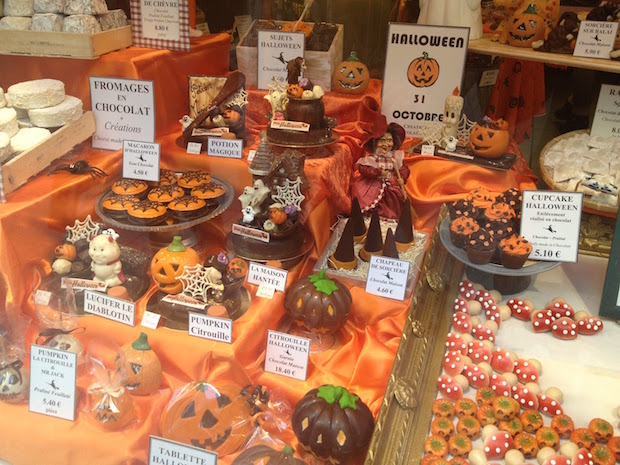Have a Hair-Raising (ébouriffant) Halloween!
It may be fair to say that in France 'Holloween' seems to be 'in the shops' and celebrated more so than in the UK but no where near as commercial as it is in the USA. Back in the late 90s I had almost forgotten about Holloween, not having children of a certain age but moving to France it struck me that all the local boulangieries and supermarkets would make grand displays of all their Holloween related goodies.
Even the smallest village shop will make an effort and if you are lucky you will even see a candle or torch lead procession in villages or towns where all the children [and parents] walk around the commune singing and celebrating. The following day is whay you have seen magnificaent Chrysanthemums for sale everywhere, All Saints Day on the 1st of November is when families remember loved ones that have passed away and visit to leave the fantastic plants and pay their respects.
If you are going to France on a viewing trip with Cle France over this period watch out for these things and let us know what you thought.
“Hair-raising” is a great adjective in English.
It’s descriptive and makes you understand exactly what it conveys… a fright that makes your hair stand up on end.
Some dictionaries offer “terrifiant(e)” as the French translation of “hair-raising”.
Another translation, and perhaps one that is more accurate, is “ébouriffant(e)”.
Neither of these words, however, are as descriptive as the original English word (this is one of the reasons why translations are so difficult!).

Take time and stop to see a great display even in a local village Boulangerie.
But there is an expression in French that more accurately conveys this English adjective: “faire dresser les cheveux sur la tête” means something that makes your hair stand up on end. It can also mean “to bristle,” which provides similar imagery, but conveys less a sense of fright than a sense of disgust or anger.
For example, you could say: “J’ai ecouté un chanteur hier soir. C’était une experience à vous faire dresser les cheveux sur la tête!” (I heard a singer last night. It was a hair-raising experience!). This could mean that the singer was so bad that it made this listener’s hair stand up on end.
Another word that could accurately translate “hair-raising” is the more familiar “horripiler”. This verb literally means to “bristle hairs” and usually conveys the sense that someone is incredibly annoyed by someone else’s actions. For example, you could say: “Tu m’horripiles quand tu fais ce bruit-là!” (You really annoy me/make me bristle when you make those noises!). The adjective form is “horripilant.”
Finally, another expression you could use is “hérisser le poil” This means exactly the same thing as “horripiler” except it is a more standard expression. “Hérisser” means to bristle or to ruffle. “Le poil” means “a hair”.
Normally, if you want to talk about the hair on your head, for example, you would say either “les cheveux” or “les poils” — notice how both are plural (unless you are referring to one single hair, the French refer to hair in general in the plural). Thus, “hérisser le poil” literally means “to bristle a hair.”
Once again, this is not normally used to mean that something scares you, but rather that something is really annoying or disgusting. For example, you could say: “Ça me hérisse le poil” which means “it really gets on my nerves.”
Ok, so we’ve gotten off the original meaning of “hair-raising” so just go ahead and have a hair-raising Halloween!
Passez un Halloween ébouriffant!
Happy Halloween!

Blog submitted by: Alex at The French Property Network - Cle France.
This blog was originally posted on The French Language Blog pages.